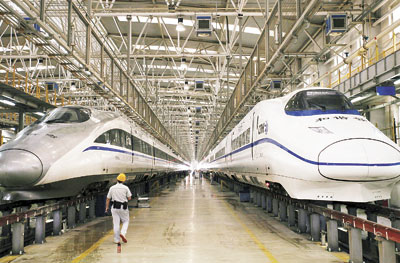|

PREMIER Li Keqiang has urged State-owned enterprises (SOEs) to press ahead with reforms to unlock vitality, Xinhua reported late Sunday.
The SOEs are an important foundation for national development but are in urgent need of reforms as languid mechanism and poor management have resulted in declining profits, Xinhua quoted Li as saying at a meeting on SOE reforms Friday.
China has about 150,000 SOEs, which hold more than 100 trillion yuan (US$15.7 trillion) in assets and employ over 30 million people. They posted a 2.3 percent decline in profits in the Jan.-July period, Xinhua said.
On Sept. 13, China issued details of plans to further reform its bloated and underperforming SOE sector in what is expected to be its biggest overhaul in two decades.
A “mixed ownership” model, intended to bring in private investors as stakeholders is one main emphasis of the plan. The government has said it expected decisive results by 2020.
Private investors will be encouraged to buy stakes in State firms, buy convertible bonds issued by State firms, or swap shares with State firms, according to the plan.
Reform guidelines have also emphasized continued Party control over key sectors and the need to balance national and commercial interests.
The premier urged the SOEs to come up with their own supporting policies to ensure the reform ambitions laid out in the guideline will be met, Xinhua said.
The SOEs must improve their management through market-oriented reforms, such as mixed-ownership reforms and a modern corporate system, Xinhua quoted Li as saying.
These State firms should improve their competitiveness, press ahead with merge and revamping, and waste no time to deal with “zombie” enterprises that are a burden to the economy, Li was quoted as saying.
Li added that innovation and entrepreneurship should play a role in the SOE reforms. “Innovation and entrepreneurship are not only the way for small and medium-enterprises to prosper, they are also crucial for big enterprises, especially the SOEs.”
The SOEs must proactively take part in international cooperation and competition, the premier said, noting that China’s Belt and Road Initiative and other endeavors aimed at international production capacity cooperation present many opportunities.(SD-Agencies)
Oil, rail sectors next in reform line: planner
CHINA’S top economic planner will implement mixed-ownership reforms in the electricity, oil, rail and airlines sectors as part of the Central Government’s overhaul of its inefficient State-owned enterprises, domestic media reported.
The comments were made by the National Development and Reform Commission’s (NDRC) assistant director, Liu He, at a recent State planner meeting, the China Securities Journal newspaper reported yesterday.
Many of China’s major Centrally owned State enterprises already have part-private ownership, including the nation’s largest oil producer, China National Petroleum, and the bigger refiner, Sinopec.
In September, State-controlled Sinopec Corp. sold 30 percent of its retail business to 25 big financial firms for US$17.5 billion, while China’s two largest trainmakers were merged earlier this year into rail giant CRRC Corp.
On Monday, State rail builder China Railway Group said it would inject equity interests in some of its industrial manufacturing subsidiaries into its unit, China Railway Erju, in exchange for the latter’s existing assets and businesses as part of a restructuring.(SD-Agencies)
|

